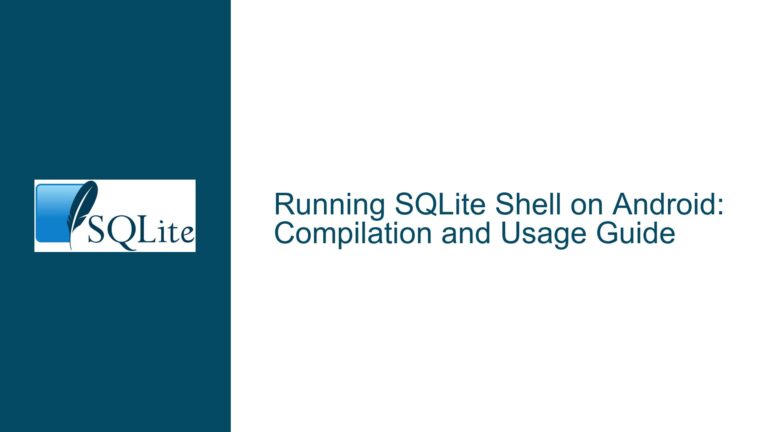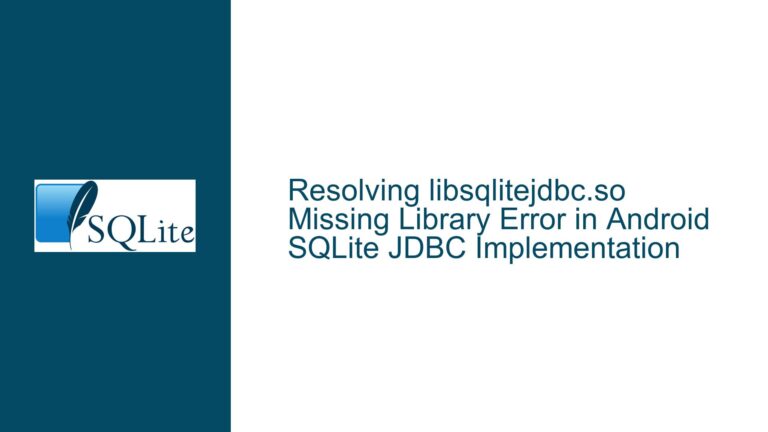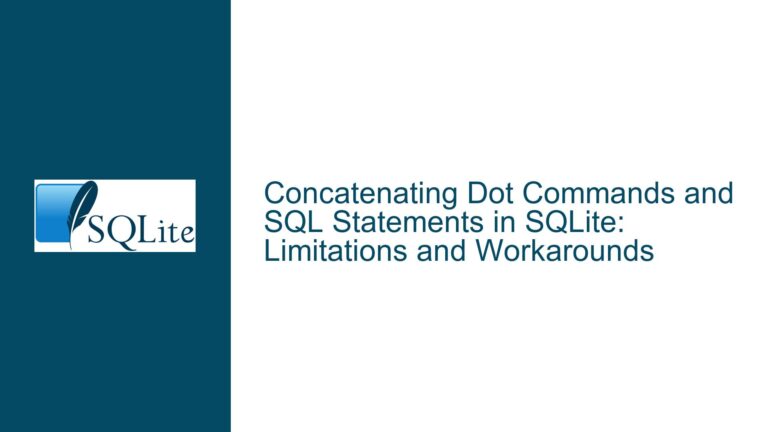GCC 14.1 String Overread Warning in SQLite Compilation at -O3 Optimization
Understanding the String Overread Warning in GCC 14.1 with SQLite
The string overread warning in GCC 14.1 when compiling SQLite at -O3 optimization level is a nuanced issue that arises due to the interaction between GCC’s static analysis capabilities and SQLite’s internal memory optimization strategies. This warning is triggered in the sqlite3Strlen30 function, which is inlined into sqlite3ColumnSetColl. The warning suggests that strlen is reading from a region of memory that GCC believes to be of size zero, which is a potential security risk or undefined behavior. However, this warning is likely a false positive caused by GCC’s inability to fully understand SQLite’s memory management optimizations, particularly around the zCnName field in the Column structure.
The zCnName field in SQLite is a clever optimization that stores multiple concatenated null-terminated strings in a single memory allocation. This design reduces both memory usage and CPU overhead by avoiding multiple allocations and deallocations. However, this optimization can confuse GCC’s static analysis, especially at higher optimization levels like -O3, where the compiler aggressively inlines functions and attempts to optimize memory access patterns. GCC 14.1, being a recent release, may have introduced new or more stringent checks that are not fully compatible with SQLite’s unique memory handling.
Possible Causes of the String Overread Warning
The string overread warning in GCC 14.1 when compiling SQLite at -O3 optimization level can be attributed to several factors. First, GCC’s static analysis may incorrectly assume that the memory region being accessed by strlen is of size zero. This assumption is likely due to the way SQLite manages the zCnName field, which contains multiple concatenated strings. GCC’s analysis might not fully account for the possibility that a single memory allocation can contain multiple null-terminated strings, leading it to flag the strlen call as a potential overread.
Second, the inlining of sqlite3Strlen30 into sqlite3ColumnSetColl at -O3 optimization level may exacerbate the issue. Inlining can sometimes obscure the context in which a function is called, making it harder for the compiler to accurately analyze memory access patterns. In this case, GCC may lose track of the fact that sqlite3ColumnSetColl is never called with a null zColl argument, leading to the false positive warning.
Third, the warning could be a result of a bug or limitation in GCC 14.1 itself. Given that GCC 14.1 is a recent release, it is possible that its static analysis capabilities are not yet fully mature or have not been thoroughly tested against complex memory management strategies like those used in SQLite. This is supported by the fact that the warning does not appear when compiling SQLite at -O2 optimization level, suggesting that the issue is specific to the more aggressive optimizations performed at -O3.
Troubleshooting Steps, Solutions, and Fixes
To address the string overread warning in GCC 14.1 when compiling SQLite at -O3 optimization level, several steps can be taken. First, it is important to verify that the warning is indeed a false positive. This can be done by examining the code in question and confirming that sqlite3ColumnSetColl is never called with a null zColl argument. If this is the case, then the warning can be safely ignored, and the compilation can proceed with -Wno-error=stringop-overread to prevent the warning from being treated as an error.
If the warning cannot be ignored, one possible solution is to modify the sqlite3Strlen30 function to include additional checks that reassure GCC’s static analysis. For example, adding a null check before calling strlen could help GCC understand that the memory access is safe. However, this approach should be used with caution, as it may introduce unnecessary overhead or complicate the code.
Another solution is to disable specific optimizations that are causing the warning. This can be done by using GCC’s -fno-inline option to prevent the inlining of sqlite3Strlen30 into sqlite3ColumnSetColl. While this may reduce the performance benefits of inlining, it can help avoid the warning without requiring changes to the SQLite codebase.
Finally, if the issue is determined to be a bug in GCC 14.1, the best course of action is to report the bug to the GCC developers and wait for a fix. In the meantime, compiling SQLite at -O2 optimization level can serve as a workaround, as the warning does not appear at this optimization level. Additionally, keeping an eye on the GCC bug tracker for updates on the issue can help ensure that the problem is resolved in future releases of GCC.
In conclusion, the string overread warning in GCC 14.1 when compiling SQLite at -O3 optimization level is a complex issue that requires careful analysis and a nuanced approach to troubleshooting. By understanding the underlying causes and exploring potential solutions, developers can effectively address the warning and ensure the successful compilation of SQLite with GCC 14.1.






